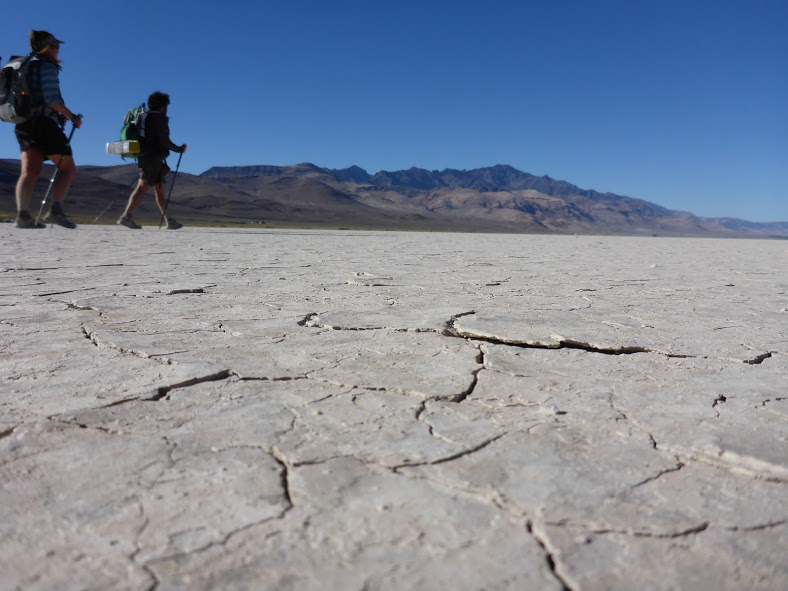The Trail Show Salty Segment March 2019
**updated May 2021**
The Question
Dear Salty,
There are a LOT of electrolyte powders and pills out there and I’m not sure how to choose the best ones. I’m obviously going to stay away from high fructose corn syrup but aside from that, I know there are different kinds of salts and sweeteners in there. Are there specific things I should avoid and/or look for? Should I just scrap electrolytes and go with POD’s method of water and plain potato chips? Should I just lick the salt off my own skin? Do I even need electrolytes if my trail meals have salt in them? Please help this guy hydrate!
Saltlick
The Answer
This is a great question because Saltlick is right, there are SO MANY options out there, and it’s helpful to know what you’re paying for and whether you even need it. Being a frugal hiker who likes to keep things simple, I get it.
What is an electrolyte?
Let’s lay some groundwork and cover what an electrolyte is and what purpose it serves in the body.
Electrolytes are electrically charged minerals that help balance fluid pressure and maintain blood pH in the body. Proper nerve, heart, and muscle function depends on adequate amounts of electrolytes dissolved in the body’s fluids. These minerals can be lost from the body through sweat.
For optimal performance, it’s important to consume both water and electrolytes. A deficiency or imbalance of electrolytes can result in dehydration, fatigue, dizziness, nausea, cramps, and spasms.
Do I even need electrolytes?
Water and food are our primary sources of electrolytes, but depending on one’s diet, water source, and level of exertion, it may be necessary to supplement with exogenous electrolytes. In general, if your activity doesn’t involve much sweating or is less than an hour in duration, the electrolytes found in whole foods should be sufficient. During activity lasting longer than an hour and in extreme heat, electrolyte powders can be a great way to supplement.
And while I 100% support POD’s method of salt intake via potato chips, sodium is just one of the minerals you need to replace to keep your body functioning optimally. So, while you’re welcome to continue licking salt off your own skin, if you’re on a long distance hike, I’d encourage you to supplement with an electrolyte powder or pill.
How do I choose a good electrolyte supplement? Here’s what to look for & what to avoid.
If you’ve determined that you could benefit from electrolyte replacement, here’s what I’d look for:
A power that contains all of the electrolytes lost through sweat, is tasty, has a reasonable price per serving, and is convenient to use.
At minimum, all electrolyte powders should have the following electrolytes: Sodium (Na+), Chloride (Cl-), Potassium (K+), Calcium (Ca++), and Magnesium (Mg+). According to the American Council on Exercise (ACE), “all electrolytes work together to maintain fluid balance in the body at rest and during physical activity, so be sure [to focus] on all electrolytes, rather than focusing on only one or two.” This is important because some outdoors people talk about taking supplements of one mineral (often sodium, potassium, or magnesium), when the body really requires all of the electrolytes. A good mix will have everything that it should and nothing that it doesn’t.
Ideally, an electrolyte mix contains the most bioavailable form of a mineral. Bioavailability refers to the amount of ingested material which is absorbed and available to the body. For example, the magnesium in the aspartate, citrate, lactate, and chloride forms is more bioavailable than magnesium oxide or sulfate.
Cost is also an important consideration. Based on my research, you should be able to find a quality electrolyte replacement for $0.35-0.60 per serving .
Taste and convenience of use (such as ones that dissolve easily and come in single serving packets), are also important considerations, especially for use in the back country.
What to Avoid in an Electrolyte Supplement
To reduce adverse reactions, an electrolyte mix should be absent of common allergens, such as soy, gluten, dairy, nuts, and artificial colors or sweeteners. Additionally, I would look out for unnecessary additives or fillers, like sugar, maltodextrin, or cornstarch. Some of these are linked to inflammation and gut dysbiosis, and some are just unnecessary in an electrolyte replacement.
Good Electrolyte Options
Based on a thorough meta-reviewed I performed for Treeline Review, my top choices considering the above information were Ultima Replenisher, Lyteshow, and Nuun. Though I haven’t tried it yet, LMNT also looks promising.
That’s my A to your Q, Saltlick. Drink up and be safe out there!

